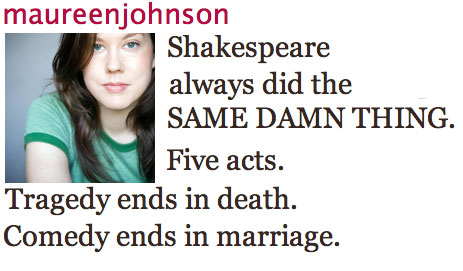Why Criticism Matters (Or Will, When It’s Done Right)

In the summer of 2010, as the mainstream literary media began its celebration of Jonathan Franzen’s Freedom, Jennifer Weiner and Jodi Picoult commented as to how that hoopla was part of a trend among publications like the New York Times Book Review, which appear to consistently favor male authors over their female counterparts. After months of refusing to seriously address this issue, even when independent observers proved the Times book desks do have a distinct gender bias, the editors of the Review, in the midst of defending their mission, decided to take a swipe at them by declaring that a “serious critic” is “not interested, say, in tabulating the number of ‘Brooklyn novelists’ who receive attention each year in publications like this one.” Whether the serious critic possesses a penchant for petty oneupmanship was, however, uncommented upon.
Let’s set aside the snark from West 43rd Street, though, and see what the guest experts they recruited to defend literary criticism bring to the table.
Stephen Burn starts with the historical big picture, observing how the Internet has facilitated forums for public discourse which demonstrate not only the existence of a broad audience for literature but its vitality. “The age of evaluation, of the Olympian critic as cultural arbiter, is over,” Burn warns, and critics “who like to issue dogmatic rulings… and to chastise writers… merely add to the noise of culture.” What’s more, he adds, “it’s time to hear less of critics talking about themselves, spinning reviews out of their charming memories or using the book under review as little more than a platform to promote themselves and their agendas.” All of which is true—and echoed by Pankaj Mishra’s assertion that “literary criticism, in its recent American incarnation at least, has faithfully reflected the general writerly retreat from the public sphere, turning into a private language devised to yield a particular knowledge about a self-contained realm of elegant consumption.”
It’s unclear whether mainstream reviewing is fully capable of Burn’s ambitious goals to move beyond the evaluation of texts; as Adam Kirsch points out in his contribution, the critic as commonly understood today usually has to be a journalist and a consumer advocate first, discussing why newly published books are significant and worthy or unworthy of your purchase, and then, if there’s any time or space left, he or she can tackle “[saying] somethng true about life and the world,” using somebody else’s writing as a springboard for “self-understanding, self-expression, [and] truth.” (Which, he adds, he’s not sure anybody is still doing anymore.) But I’d also suggest that the lively readership Burn cautiously celebrates, the band of “common readers” Kirsch isn’t sure still exist, is already fulfilling, here and there, Burn’s “most important” aspiration: “locating major works that are not always visible in mainstream networks.” The problem for us readers, and it’s a big problem, is knowing where to look.
2 January 2011 | theory |
Your Attacks on Genre Fiction Grow Tiresome
Basically, there are only two reasons to invoke genre when discussing literature, and both of them are about marketing. You can classify a book as belonging to a genre in order to underscore its appeal to a potential reader: If you liked this and this and this, then you may like this, for it is similar to the others. Or you can classify a book as not belonging to a genre in order to underscore its appeal to another potential reader: “Genre novels are all alike,” a book snob might tell you, “every literary novel is literary in its own way.”
No, really: That’s pretty much Edward Docx’s argument in a recent Guardian essay, only he never quite boils it down that succinctly. For him, it’s about how “even good genre… is by definition a constrained form of writing,” so “if you are following conventions, then a significant percentage of the thinking and imagining has been taken out of the exercise.” One assumes that the opposite must therefore be true of the “literary” novel, the author of which can make innovative textual decisions without any thought to convention or precedent, merrily re-inventing the very medium of the novel with each keystroke. One must assume this, because even Docx doesn’t have the audacity to actually set something that ridiculous into print.
OK, I lied at the beginning, because there’s actually a third good reason to talk about elements of genre, the discussion of typology and convention for the purposes of criticism—seriously, it’s like Docx never even cracked open a copy of Northrop Frye’s Anatomy of Criticism, for if he had, he would have been reminded that the very novel is itself a genre. (And, too, he would surely have recognized that the role of a public critic, such as he is playing for The Guardian, is not scholarly or scientific, but rather another artistic contribution to the history of taste. Much like this!)
Even the most literary literature is, at its foundations, generic. Would Docx suggest that Hamlet was easy for Shakespeare to write because so much of the thinking and imagining had been done for him beforehand?
16 December 2010 | theory |


 Our Endless and Proper Work is my new book with Belt Publishing about starting (and sticking to) a productive writing practice.
Our Endless and Proper Work is my new book with Belt Publishing about starting (and sticking to) a productive writing practice. 
